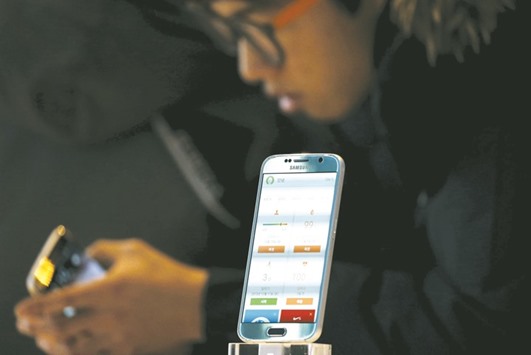A US court ruled in favour of Apple Inc in its patent battle with Samsung Electronics and ordered the South Korean company to stop using software in the US that helps mobile phones infringe on those patents.
Samsung has to stop making, using, selling, developing or designing software or code that helps its products infringe on three patents. Those inventions cover mobile-phone features such as autocorrect, slide-to-unlock and data detection, according to the order by the US District Court in San Jose.
The two smartphone giants have pursued legal cases against each other around the world, claiming that the other’s devices infringed on their own patents. They had little to show for it before deciding in 2014 to drop all cases except two lodged in the federal court in California that issued Monday’s order. The court’s ruling affects software or code used in older Samsung models such as the Galaxy S II, S III and Note smartphones.
“It seems the US court didn’t take anyone’s side and managed to take care of both companies,” said Jung Dong Joon, a patent lawyer with SU Intellectual Property in Seoul. “The latest move will only have a minimal impact on Samsung’s mobile business because most of the models to be banned are too old, while it gave Apple more negotiating power when it comes to patents.” Enforcement of the order will begin in 30 days, the court said. Apple didn’t respond to requests for comment.
“We are very disappointed,” Samsung said in an e-mailed statement. “While this will not impact American consumers, it is another example of Apple abusing the judicial system to create bad legal precedent, which can harm consumer choice for generations to come.” The years-long disputes between the rivals – and business partners – centered on software-design features that have become second nature to many mobile users, from swiping to unlock a sleeping device to automatic correction of typos in messages. While the injunction covers older models, Apple can go back to the judge and argue that Samsung’s newer devices still infringe on its patents.
Apple and Samsung ship about a third of the world’s smartphones combined, according to data compiled by Bloomberg.
Apple devices also use chips and displays made by Samsung.
Apple won a US appeals court ruling in September that could have consequences for how disputes are resolved when it comes to complex devices and may help patent owners limit copying by rivals. The ability to block use of an invention is a powerful tool that increases the price tag when the creator negotiates
settlements.
Samsung tried unsuccessfully to get that appeals court decision overturned. Google, HTC Corp, LG Electronics and Rackspace Hosting backed Samsung in its arguments, arguing that a victory for Apple could allow patent owners to unfairly leverage their intellectual property for competitive gain.

A customer tries out a Samsung mobile phone at its headquarters in Seoul. A US court yesterday ordered the South Korean company to stop using software in the US that helps mobile phones infringe on Apple’s patents.
